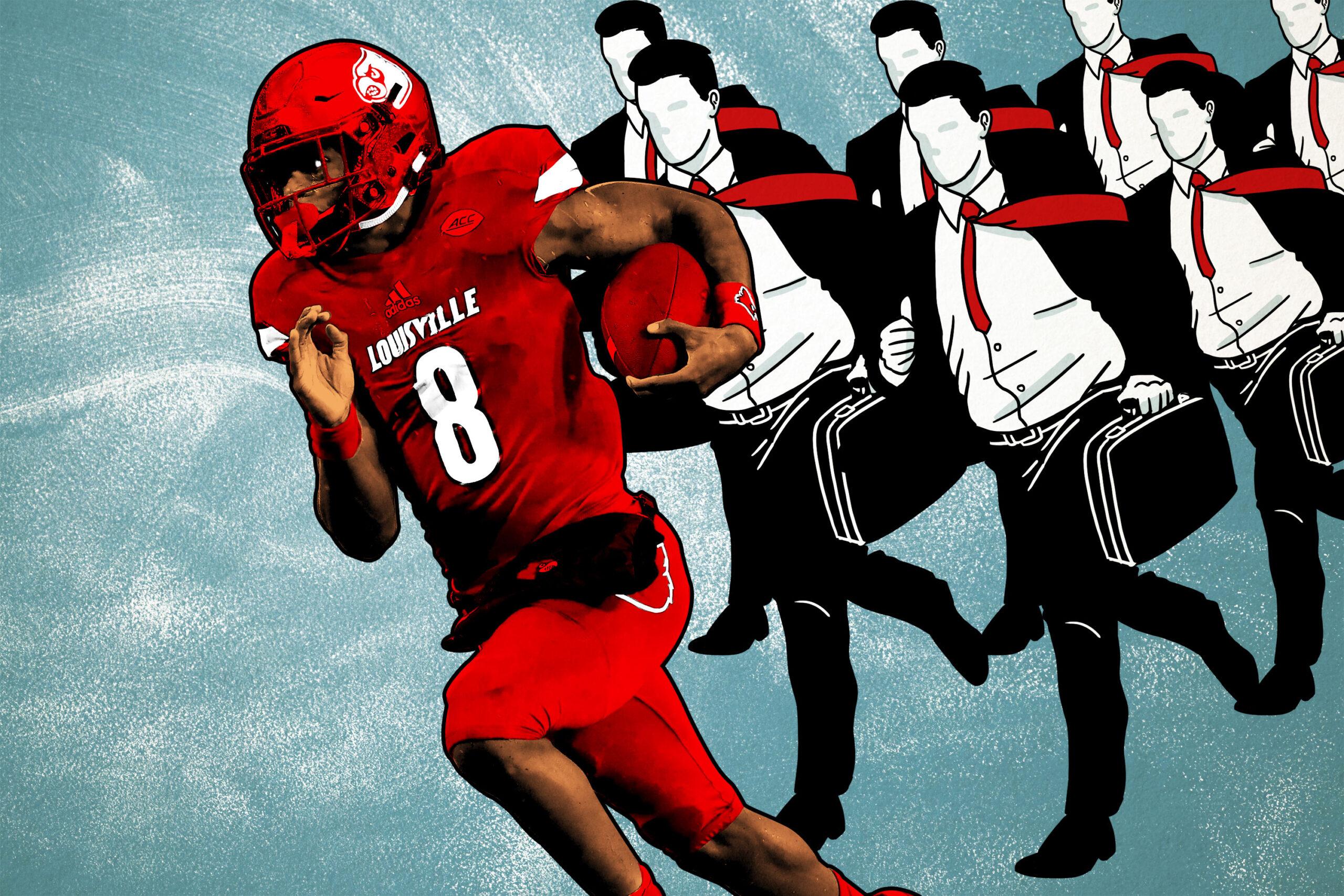
Before ever playing an NFL down, Sam Bradford signed a deal guaranteeing him more money than any other player in NFL history, rookie or veteran.
Bradford, the 2010 no. 1 overall pick, inked a six-year deal after the draft that guaranteed him $50 million. It was the latest monster contract handed out to a top draft pick, and owners and players alike agreed that rookies were earning too much money in comparison to their veteran counterparts. Together, they changed the rules in the 2011 collective bargaining agreement and introduced a rookie wage scale. Now rookies are paid based on their draft slot with little variance. A year after Bradford’s monster deal, no. 1 overall pick Cam Newton signed a four-year, fully guaranteed deal for $22 million—less than half of what Bradford got. With almost no room to negotiate their first contract, some rookies are entering the draft wondering why they would need to sign with an agent.
Lamar Jackson, the Louisville quarterback and 2016 Heisman winner projected to go somewhere in the first round, has the potential to alter the league with his play. Off the field, he’s already blazing a path as the most talented prospect to date to ask a fundamental pre-draft question: If rookie deals are set in stone, why spend a chunk of that salary on an agent?
Jackson has hired a lawyer for contract review, and his mother Felicia is serving as his manager, but he won’t hire an agent certified by the NFLPA before the draft on April 26.
“I know coming in as a rookie, agents don’t negotiate anything really,” Jackson said at the NFL combine. “You know you’re gonna get the salary you’re gonna get, and I decided I don’t need him. He’s going to be taking a big cut of my paycheck anyways, and I feel I deserve it right now.”
Jackson won’t be the first player to abstain from signing an agent this year: Richard Sherman negotiated his own deal with the 49ers this offseason. Sherman has adamantly defended the deal, but some have convincingly explained that Sherman’s getting below-market compensation. Before him, Chargers left tackle Russell Okung implored players to negotiate their own contracts, which Okung has done with mixed results. Yet while veteran players are at serious risk of being swindled by front offices, the standardization of rookie contracts makes it an entirely different conversation for young players entering the league.
In 2013, Florida safety Matt Elam, projected as a first-round pick, had a conversation with his older brother, former NFL safety Abram Elam, and chose not to be represented by an agent: Elam ended up getting drafted at no. 32 overall by Baltimore and signed a four-year deal with $5.44 million guaranteed, saving himself roughly $203,000 in agent fees. University of Miami left tackle Ereck Flowers heard Elam’s story and did the same thing two years later, saving somewhere between $432,000 in fees on his four-year, $14.4 million guaranteed contract. The following year, in 2016, quarterback Jacoby Brissett, being counseled by Abram Elam (and Bill Parcells!), was the only player in the 2016 draft who didn’t hire an agent. He was drafted in the third round by the Patriots and signed a deal a month after the other Patriots rookies had signed, but saved himself roughly $100,000 on a three-year, $3.4 million deal with $680,604 guaranteed. Recent history suggests Jackson will get a deal similar to what an agent would have gotten him, likely saving at least $200,000, depending on where he’s drafted.
There are certainly risks for players, however. Some teams have begun to insert nefarious language into rookie deals, like clauses that void guarantees in the case of arrests, suspensions, or even fines for being late. But that’s presumably what Jackson’s contract lawyer is there to help with. The question becomes whether an agent would affect how high Jackson gets drafted.
Agents don’t just negotiate contracts—they help players during the pre-draft process. Agents can place players into fancy training academies, prepare them for aggressive interviews at the NFL combine, coordinate private workouts with NFL teams, spearhead sponsorship and endorsement deals, and hype them both publicly and privately. That’s a wide range of responsibilities for Jackson and his mother to handle. Jackson earned headlines last week because he refused to run the 40-yard dash or agility drills at his pro day to hammer home the fact that he is not a wide receiver, but a far more relevant story for his draft stock is that teams trying to contact Jackson for private workouts were not always getting called back.
For rookies, the ancillary benefits an agent provides—like experience navigating the draft process—may mean more than the negotiating power an agent wields. For Jackson, the fifth wheel in a crowded quarterback class, how he navigates the pre-draft process may have a bigger impact on where he gets drafted—and therefore how much money his rookie deal is worth—than it would for the average first-round prospect.
Rare instances aside, we’re unlikely to ever find out why teams pass on certain prospects, but that won’t stop future players from looking to Jackson as the model for a premier talent eschewing an agent in the draft process. If Jackson slides out of the first round, it could look like not having an agent hurt Jackson’s draft stock and cost him much more than the cut an agent would have taken out of his rookie contract. But if Jackson does get selected in the first half of the first round, future players may rethink the automatic reflex to hire an agent or continue the new trend of reducing agents’ fees, negotiating with their negotiators. Jackson’s betting on himself, and he’s not paying anyone a vig to do it.
An earlier version of this piece referred to ancillary benefits as auxiliary benefits.

